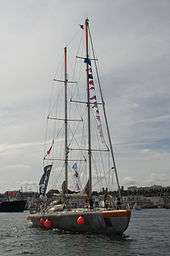Tara expedition
.jpg) Schooner Tara. | |
| History | |
|---|---|
| Name: |
|
| Builder: | SFCN Villeneuve-la-Garenne |
| In service: | 1989 |
| Homeport: | Lorient, France |
| General characteristics | |
| Type: | Ketch |
| Displacement: | 130 t (128 long tons) |
| Length: | 36 m (118 ft) |
The Tara expedition is a research expedition through the ice of the Arctic.
The boat
Tara is a 36 metre aluminum-hulled schooner, formerly named Seamaster.[1] Under its former name, it was owned by Peter Blake, who was shot and killed in 2001 by pirates while sailing Seamaster on the Amazon river.[1] Following Blake's death, the yacht was bought by Etienne Bourgois, renamed Tara and dedicated to environmental expeditions.[2]
Expeditions
The polar schooner Tara was to drift in the ice for approximately two years from its departure, late in August 2006. In the community of oceanography it is met with great interest especially in the context of the International Polar Year (2007–2008). This expedition, dubbed Tara Arctic, ended on February 23, 2008. It was part of the international DAMOCLES (Developing Arctic Modelling and Observing Capabilities for Long-term Environmental Studies) program.

In 2009, Tara started on a new expedition, dubbed Tara Oceans.[3] It travelled around the world until 2013 to study CO2 captured by marine microorganisms such as plankton. The costs for the expedition are 3 million euros per year, all from private funds. The expedition was primarily funded by the French fashion designer agnès b..[4] The expedition was able to collect more than 35,000 planktonic samples from 210 stations in every major oceanic region, which through analyses revealed more than 40 million genes, most of which are new to science.[3][5]
See also
References
- 1 2 "Sir Peter Blake's former yacht sails into Whangarei".
- ↑ Ainsworth, Claire (5 September 2013). "Systems ecology: Biology on the high seas". Nature. 501 (7465): 20–23. doi:10.1038/501020a.
- 1 2 "Tara Oceans expedition yields treasure trove of plankton data". Science Daily. ScienceDaily. 21 May 2015. Retrieved 17 August 2015.
- ↑ Morelle, Rebecca (22 May 2015). "Ocean's hidden world of plankton revealed in 'enormous database'" – via www.bbc.com.
- ↑ "Tara Oceans expedition: researchers map the world of plankton". UNESCO. UNESCO. 26 May 2015. Retrieved 17 August 2015.